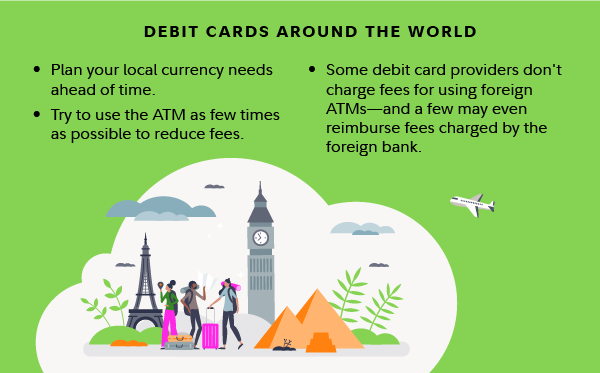Cash may not always be the best option for spending when traveling, whether it's in the US or internationally. Carrying a wallet full of cash can be risky—if your wallet is stolen or lost, the chances of getting your money back are slim.
Using debit or credit cards can be the safest and most cost-effective way to pay worldwide. Whether you pay with a debit card or use a credit card, plan ahead to avoid fees so you don't pay more than necessary.
Fraud protection when traveling with credit and debit cards
Credit cards come with some advantages when traveling—federal law protects you against unauthorized charges. The law limits your liability to $50, but many credit card issuers offer zero-liability protection.
The protection extends to payments made with a phone (aka digital wallet), online, and at physical terminals. Having a credit or debit card linked to your phone, is another convenient and secure way to pay.
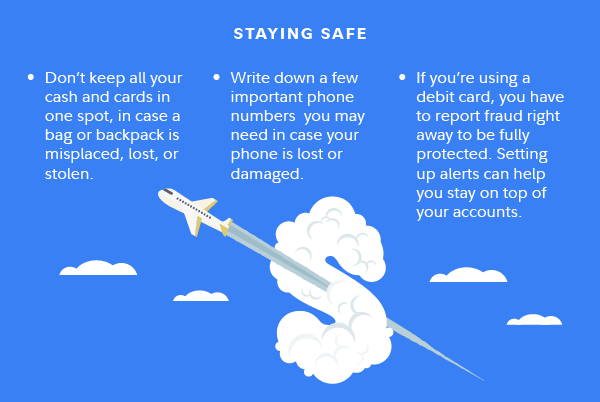
For extra protection, setting up alerts can help you manage your cards and stay connected to your accounts 24/7. As soon as a purchase is made, a text or email notification can alert you to the activity.
Traveling with a credit card
Before you travel, find out if your card issuer prefers to be notified of your travel plans. To set a travel alert, call the toll-free number on the back of your card or log in to the website to let the card issuer know where you're traveling. It will reduce the chance of your transactions being flagged as unusual and possibly declined.
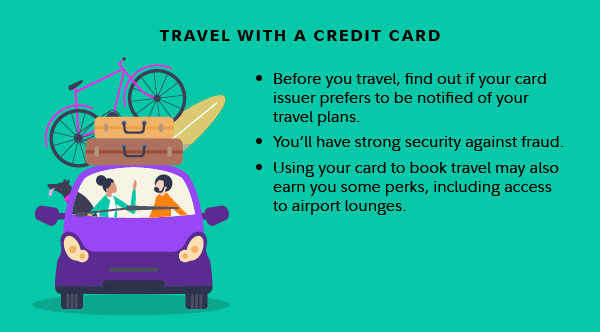
Security against fraud is key, but a secondary benefit of using credit cards are the perks. If you use your credit card to book travel, there may be some benefits offered that could help with your trip. Coverage and benefits vary across cards, so consider researching what's out there if you have time:
- Emergency card replacement and emergency cash disbursement
- Travel insurance
- Travel accident insurance
- Lost luggage reimbursement
- Roadside assistance
- Travel and emergency assistance services
- Car rental insurance
If you're traveling by air, some credit cards allow access to airport lounges—though these cards typically come with an annual fee.
Using credit cards internationally
If you're traveling internationally, credit cards may help you save money converting dollars to the local currency. Purchases made with a credit card typically get a better exchange rate than from a currency exchange vendor or banks because your card issuer offers close to the best rate available as it's set by the major networks, Visa® and Mastercard®—they facilitate payments around the world between businesses, banks, and consumers. There are other networks including Discover® and American Express®, but Visa and Mastercard are more widely accepted.
A potentially more expensive option for making purchases when traveling is Dynamic Currency Conversion (DCC). With DCC, merchants or banks can process a transaction in the customer's home currency for an added fee.
The service is often touted as a convenience to customers by allowing them to see what they're paying at the time of the transaction rather than having to wait for the charge to post online or show up in a monthly credit card statement. However, many experts feel that it's simply another way for banks and merchants to charge additional fees to unsuspecting customers.
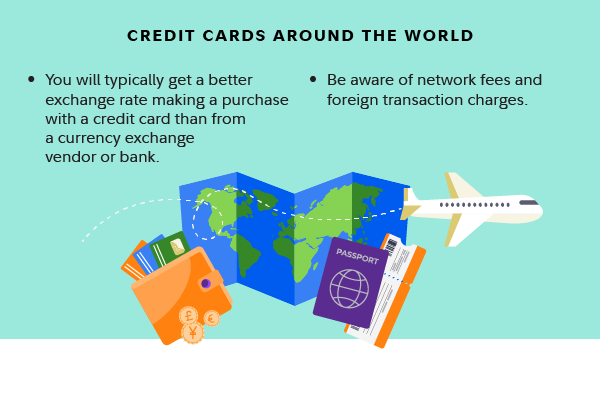
Additionally, a network fee may be charged, depending on the policies and features of your credit card, as well as a bank fee—this makes up the foreign transaction fee typically charged by your card issuer, up to 3% of each purchase.
If you shop around ahead of time for a new card with no foreign transaction fee plus cash-back rewards—like the Fidelity® Visa Signature Card—you could potentially benefit.
Since credit cards offer more fraud protection, using them for most of your travel spending could be advantageous.
Traveling with a debit card
You may need cash, and need to use your debit cards.
Be aware of the fees that can come with withdrawing cash. Reimbursement of ATM fees can be a helpful and economical banking feature. If it's not offered by your financial institution, consider shopping for a new one before embarking on a trip. The average ATM fee in 2024 was $4.77.1
The Fidelity® Cash Management Account automatically reimburses you for ATM fees charged by other institutions2 while using the Fidelity Debit Card3 at any ATM displaying the Visa®, Plus®, or Star® logo.
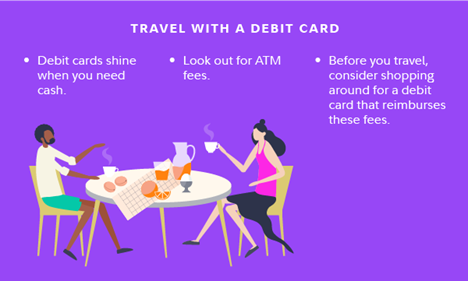
Using debit cards internationally
Taking money out of an ATM in a foreign country typically incurs a fee from the local bank that owns the ATM and your bank at home. Researching when and how you will be charged fees can be helpful because some debit card providers don't charge fees for using foreign ATMs—and a few may reimburse fees charged by the foreign bank. Planning withdrawals in advance can help you minimize any fees that could be charged.
